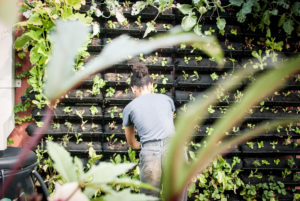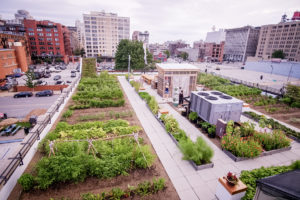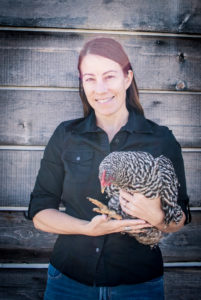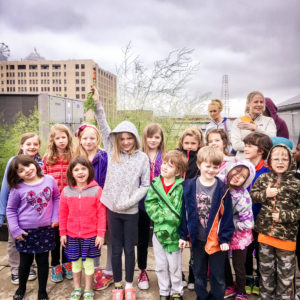How did you get started in the food system?
I got started as an eater, just like everyone else; as a conscious, healthy eater that was concerned about the industrial ag system in our country. To make a long story short, I fell into this unknowingly. I moved to downtown St. Louis 7 years ago and had nowhere to grow my own food. I was at a point in my life where I just wanted that skill and control over what I was eating. So, I started an initiative to grow food in my neighborhood with a community garden and then it exploded out of control for the next several years until I got to where I am today, an interest turned into a deep passion and and now it is my career.
What did you do before urban farming?
I am an architect with a Master’s degree in Sustainability Leadership. Before I started working full time for Urban Harvest STL, I was working for a global architecture firm as a sustainability consultant for many years, then briefly in the Office of Sustainability at Washington University. The non-profit started as a side hustle for many years, but I’m glad I can focus all of my energy on it now.
What part of the food system do you work on?
We focus on many different parts of the food system, as they are all interconnected. To name a few: food access, local food systems, urban agriculture, education, community engagement, agritourism. Agritourism focuses on the opportunity to get the public onto a farm, which usually takes place in the form of events or tours. We see it as a form of community engagement to get people to a farm and learn about it in different ways than just volunteering with us.
Can you tell us more about Urban Harvest STL?
Urban Harvest STL is a nonprofit with a social mission focused on food equity and education. One of our main programs is our food access program, which includes us growing food and collaborating with community partners to help distribute it to Northside food desert neighborhoods. Our other main component is education, which we carry out through our Leadership in Urban Ag Internship program, field trips and volunteer opportunities. Our internship program provides young people skills to grow their own food in an urban environment, while gaining experience in nonprofit management, event planning, volunteer management – so it is a leadership opportunity in an urban agriculture context. We also have a schoolyard garden at Flance Early Learning Center that is integrated into their playground and the food that is grown goes directly into their cafeteria.
Where did you get the idea to grow food on a roof?
Really it just came out of our situation of being downtown and not being able to find ample, available, or affordable space to grow on the ground. So I just had this idea, looking around at all these vacant rooftops, why can’t we do this? I basically googled ‘rooftop farm’ back in 2012 and learned that two existed in the US at that time so someone had already done it and it was feasible! I went to those farms in Brooklyn, met the farmers, learned from them and used my background in architecture and design to design a community space that was also productive farm. My husband and I are both architects, so it just made a whole lot of sense, we had the skills and knowledge to make a project like this come to fruition.
What are the biggest barriers for people who want to garden or farm in the city?
I think access to land is one of them. At least in the downtown and other neighborhoods that don’t have a lot of LRA space. That may not be the case across the city, whatsoever, but in our neighborhood that is the biggest issue. Land remediation is another drawback. We can’t just plant right into the ground because most of it is contaminated so there becomes a cost associated with building raised beds, bringing in fresh soil, etc. I also think knowledge and time are barriers. We do have some systems in place to get the average gardener up and running if they want to join a community garden. But for entrepreneurs, there can be a learning curve. Taking the time to build the skill-set and the knowledge plus having mentors before starting their own projects is so important for new farmers.
I get calls from around the country, even as far as Amsterdam, especially university students that maybe just did a project and want their career to be rooted in urban farming. Those of us that have done it need to share with those who are aspiring to do it. The interest is there. There are so many people with really big dreams and I just tell them to go volunteer on some farms. Do it as a side hustle for a few years before you transition so you know what you are getting yourself into, build up the skills to ensure your success in the long term.
What partners do you work with? Why is collaboration important?
Urban Harvest STL is built around collaboration. We join efforts with other organizations in various capacities to accelerate our collective impact. I think the food system is such an integrated network that we have to be connected and work together in order to make an impact. So, for us, we learned pretty early on that we wanted to focus on food production and innovations in urban agriculture, kind of experimenting with different ways to grow food in a city. The distribution side of agriculture was a completely different animal. We sought out community partners that were already serving the areas that we were targeting, near Northside food deserts, which are located in close proximity or in the same neighborhoods as our farms. We started collaborating with them because they needed access to healthy food and we wanted to get our food in the hands of people that needed it in those areas. I would say our closest partner is the St. Louis MetroMarket. We donate food to them weekly and it goes onto their market bus. Some of it comes from the Food Roof Farm but we also have 12 community garden plots at the Fresh Starts garden in Jeff Vanderlou where we grow specifically for the bus that serves that neighborhood. We harvest in the morning, walk it over to the bus and it gets sold to that neighborhood that same day.
Any new projects in the works?
We will likely have one or more urban farms in the spring, one on a roof and one on the ground. I can’t say where or for sure that it will happen, because sometimes these things fall through. But we are definitely looking to expand to a larger site, grow our network of urban farms, and expand healthy food access in St Louis.
How do you see urban agriculture as a part of St. Louis?
I think urban agriculture is not only just important to St. Louis, but an integral part of the future of our city and region. Obviously, there is a need for access to fresh and healthy food in St. Louis given the prevalence of food deserts. But on a larger scale, due to climate adaption, it is a necessity for people to grow food in urban environments. It’s definitely part of a larger conversation.
Where do you see the future of STLs food system?
I see it expanded from where it is now. I think there is a huge opportunity for people to grow more and do more and for more people to become a part of it. I also see it more connected. We have a lot of great urban farms and farmers across the city but we are all so busy and tied to our own work that historically, we haven’t taken a whole lot of time to connect ourselves. But I think through STLFPC and us realizing that this is a necessity, we are starting to prioritize coordinating and working together more. More partnerships have come out of it. I think it will be a more connected network with some strategy behind it which will better allow newcomers to plug in where there is a need and not necessarily just a desire. I think it will, literally, keep growing from here.
Find more about Urban Harvest STL at their Facebook page and website.




